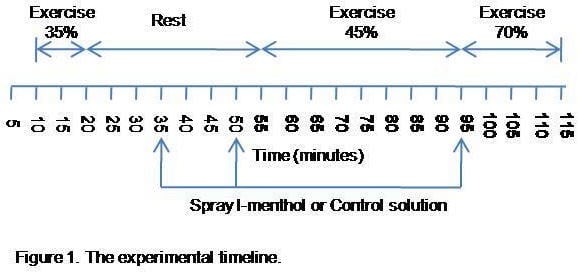L-menthol elicits a cool sensation when applied to the skin (McKemy et al., 2002). This raises the possibility of using l-menthol to increase thermal comfort when working in the heat. Before this is recommended, the effect of l-menthol on body temperature regulation should be determined. The aim of the present study was to determine the effect of 0.2% l-menthol on body temperature regulation. It was hypothesized that there would be no difference in the measured responses between a l-menthol and Control condition during moderate and high intensity exercise. Eight volunteers visited the laboratory on three occasions separated by at least 24h. On the first day they completed a peak power test; on the second and third days they completed a 115min cycle in the heat (31°C, 70% relative humidity) comprised of a 10min warm-up cycling at 35% of peak power output (PPO), 45min of seated rest on the cycle ergometer, exercise at 45% of PPO for 40min followed by exercise at 70%PPO. Participants undertook two counterbalanced conditions: (1) upper body spraying with 0.20% l-menthol at 35, 50 and 95min (2) upper body spraying with a Control solution containing no l-menthol at corresponding times. Measures: Heart rate (HR), rectal (Tre), skin (Tskin), mean skin (MST) and mean body (Tbody) temperatures, sweat rate (SR), thermal comfort (TC), thermal sensation (TS), and irritation (IRR). Analyses were undertaken up to the 97 minute, after which time subject withdrawal reduced participant numbers. No significant differences (repeated-measures analysis of variance, P<0.05) were observed in HR, Tskin, MST, SR or TC, between conditions. Tre and Tbody were significantly higher (P<0.032) at some time points (5, 15, 25, 35, 85, 95min [pairwise comparison]), but the absolute difference between conditions was less than 0.1°C. Perceptually, participants felt significantly cooler (P<0.023) when l-menthol was applied, but all participants noted some form of irritation following the application of l-menthol, no irritation was reported in the Control condition. The hypothesis is supported and it is concluded that, under the conditions of the present experiment, the application of a solution containing 0.2% l-menthol does not have a detrimental impact on body temperature regulation when compared to a Control solution without l-menthol. Although l-menthol made participants feel cooler, they were no more comfortable, probably due to the irritation caused by l-menthol.
King's College London (2009) Proc Physiol Soc 14, PC3
Poster Communications: The effect of l-menthol on thermoregulation and sensation during exercise in a hot and humid environment.
J. Gillis1, M. Barwood1, M. J. Tipton1
1. Department of Sport and Exercise Science, University of Portsmouth, Portsmouth, United Kingdom.
View other abstracts by:
Where applicable, experiments conform with Society ethical requirements.

